Bundle up, WordPressers! If you’ve got two or more WordPress plugins in your inventory, you may be sitting on a uniquely packaged solution known as a WordPress plugin bundle. Solution-rich product bundles offer excellent value that could generate more sales, more customers, and — of course — more profit 😉
To help you figure out if you’re in a position to create WordPress plugin bundles, I sat down with Freemius founder and CEO Vova Feldman. He gave me the lowdown on combo deals and shared the steps for shuffling to the bundle boogie. He also explained why WordPress plugin bundles can help entrepreneurs sell more products, upsell flagship offerings, create brand exposure, and even aid in setting up businesses for potential acquisitions.
Without further ado, let’s unpack (can’t resist me a pun 😁) the specifics around plugin bundles.
What Are WordPress Plugin Bundles?
WordPress plugin bundles have two main characteristics:
- A plugin bundle is a collection of plugins, add-ons, or extensions that solve a problem or offer a solution for a specific niche or use case. Software products are often combined with non-technical assets like eBooks (more on this later).
- A WordPress plugin bundle offers customers a cost-effective value proposition because it’s a discounted combination of products in a single unit. As per Zoho’s on-point analogy in this article: “McDonald’s Happy Meals are an example of product bundles. Instead of selling a burger, soda, and french fries separately, they are sold as a combination, which leads to more sales than offering them separately.”
Besides not being particularly tasty, WordPress bundles differ from fast food in one key area: quality over quantity. Vova explains:
The value of a WordPress plugin bundle isn’t determined by how many products it includes, but instead by how well the products — particularly WordPress plugins/add-ons/extensions — work together. It’s not uncommon to see plugin bundles that consist of only two products.
Think about it — why would you reinvent pairing red wine with, errr… cheese?
While some people are fine with a wine pairing once in a while, others want the whole vineyard. Let’s look at how WordPress plugin bundles differ from bundle memberships.
Selling WordPress Bundle Products vs Memberships
“A traditional membership is typically an all-access pass to a site’s content,” Vova explains. Think of subscribing to an online newspaper: your membership gives you access to breaking news stories, crossword puzzles, those really addictive recipe videos, etc.
Vova elaborates: “A WordPress bundle offers access to a predetermined collection of products. A WordPress bundle membership, on the other hand, gives a user access to your entire existing product catalog as well as future products at the same price point. Naturally, they’re more expensive than bundles. However, you can’t offer memberships if you only have three or four products in your arsenal.” It stands to reason that membership deals become viable once you’ve got a sizable product selection in place.
Memberships also offer users an ‘investment’ of sorts. Should you develop a breakthrough, high-end new product down the line, they’ll get to use it at no additional charge.
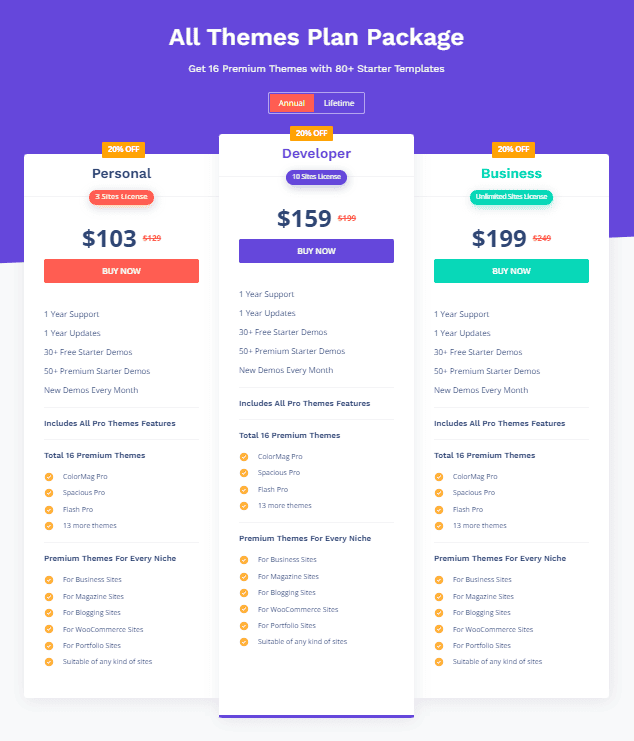
Both bundles and memberships have benefits. From a pricing and packaging perspective, it’s ideal to offer both, if you can. “A membership will fetch a far higher price than a bundle because it’s a deal on your entire inventory, present and future,” Vova says. “The reason memberships are more expensive is that monthly and annual income from customers who bought them remains the same, no matter how hard you work to build new products. You’ll also have to offer support for new products at no additional cost to membership customers.”
In time, as your inventory grows, you can also offer different membership tiers. For argument’s sake:
- Tier 1 gives you 15 products of your choice (remember that bundles differ from memberships because they are pre-packaged).
- Tier 2 offers access to 25, etc.
- Tier 3 — the highest offering — could be all-access membership to both current products and future ones.
Memberships are also an intelligent model for certain WordPress businesses:
- Businesses that sell add-ons — smaller plugins with a single capacity — will keep on adding more over time for different integrations. In this case, it makes sense to have a system where customers pay a higher price for access to future add-ons.
- Check out Pavel Ciorici’s blog post about why memberships are useful for theme shops that work with agencies. He explains: “If you manage to find an ideal balance to increase sales and provide good value to your customers, then you’ll have even greater chances of success.”
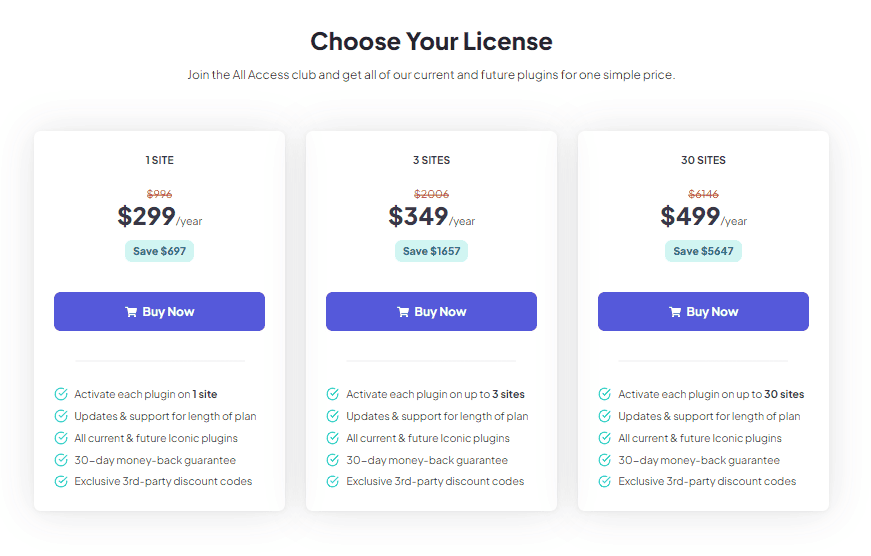
Now that we’ve established the differences between bundles and memberships, let’s examine the pitfalls and plusses of offering WordPress product bundles.
Pros and Cons of WordPress Plugin Bundles
The pros far outweigh the cons when it comes to bundles. Along with Vova’s input, I’ve also included insights from industry experts who participated in our Experts Corner.
Pros
- Vova and Iain Poulson both insist the most obvious (ergo the biggest) pro of WordPress bundle products is that you can make more money by offering more value and discounts. “Bundling can drastically increase individual customer spend and monthly revenue,” Iain says. Vova emphasizes the importance of clever pricing and insists that plugin bundles can help you upsell your flagship products and even move less popular ones. “Say you have a killer product that’s priced at $100 and a less in-demand product that’s selling at $50. You bundle them at $110. Theoretically, you’re losing $40. But on the other hand, you’ll likely sell more products because the bundle offers customers a massive saving.”
- Plugin bundles put individual products in front of more customers, automatically creating traction for them. This is because customers will probably inspect each product in the bundle — not just the one(s) they’re most interested in.
- Jason Coleman from Paid Membership Pro says plugin bundles and memberships ensure customers don’t feel “nickeled and dimed”. A discounted price for a bundle of popular products or a membership pass equals value for money and could go a long way to make customers stick with you as the market changes. Although bundles and memberships come at a higher price point than a single product, they’re likely to create a value perception in the customer’s mind.
- Dave Rodenbaugh says WordPress plugin bundles’ higher price point allows you to focus on customers who are willing to pay good money for your products. Effectively, this means you can focus on making better products because you’re receiving remuneration that sustains your business and frees up your time — fewer money worries = more room for innovation.
- Despite the higher price point, the discount on a bundle compared to the collective prices of its individual products is really high. And it offers a great value proposition to customers, which will likely increase your profits. “Let’s say you’ve got twenty plugins. The chances of selling more than two or three individually to the same customer are very slim,” Vova says. “But by bundling your entire 20-plugins inventory and offering it with a 50% discount, your average spend per customer could be the equivalent of selling up to 10 plugins.”
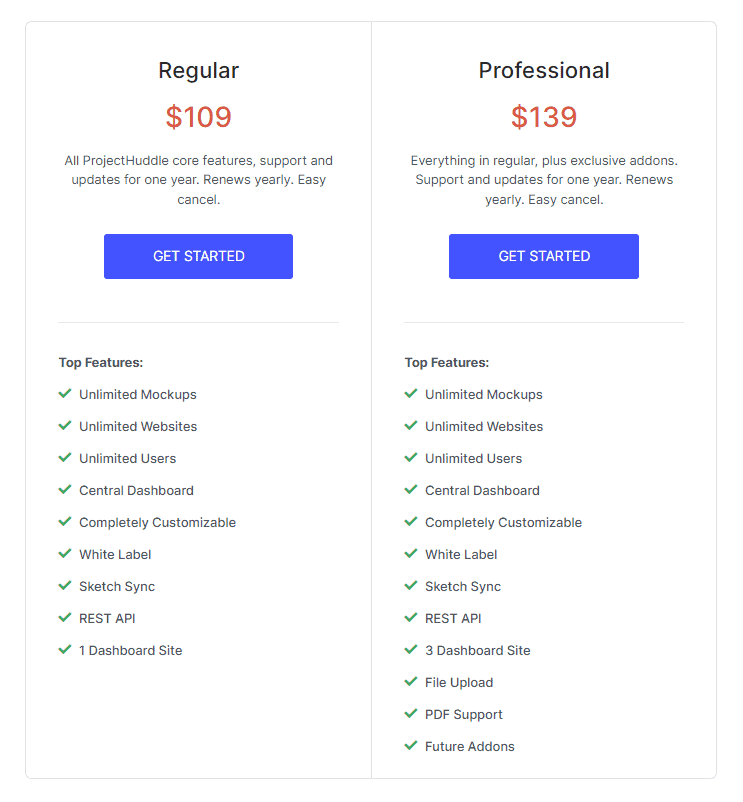
Fair enough. So, what are the cons?
Cons
I know this sounds too good to be true, but the truth is there aren’t any cons to selling WordPress plugin bundles or memberships 😅 None that Vova or any of Freemius’s partners have experienced, anyway. However, take note of the following:
- Yes: the heavily discounted price does theoretically mean you’re selling each plugin below its value. Plus, you’ll have to provide the same level of support as you would for a customer that paid the full price. But as Vova explained, bundles and memberships are likely to drive up your customer spend, which equals more money in your bank account to help you grow your business and hire support staff if needed.
- This isn’t a con per se, but rather a friendly disclaimer: “No matter how little you charge or when you do it, there’ll always be someone who’s unsatisfied,” Jason Coleman warns. “However, be careful not to let customer complaints determine your product bundle pricing.”
While there aren’t (m)any direct cons to selling plugin bundles and memberships, there are a few problems that can arise. They don’t raise any major red flags, but heeding them in advance will help you avoid costly inconveniences.
Subscribe and grab a free copy of our WordPress Plugin Business Book
Exactly how to create a prosperous WordPress plugin business in the subscription economy.

Potential Risks With Monthly Subscriptions, Trials, and Moneyback Guarantees for Plugin Bundles and Memberships
First potential risk: beware of opportunists. A cunning customer could use their membership to download your entire product inventory and promptly cancel their subscription. Luckily, there’s a way to avoid this:
- Make sure you limit the number of products subscribers can download every month.
- Put a licensing system in place to protect you. “While — conceptually — this is an easy solution, I’m unfamiliar with licensing systems in our space that support this functionality,” Vova says. “You’ll likely need to develop some custom functionality of your own to facilitate this kind of protection.”
Now that we’ve unpacked the nitty gritty/manageable hurdles behind WordPress product bundles and memberships, let’s see if offering them is right for your business.
Putting a WordPress Plugin Bundle Together — Where to Start?
First things first: to create bundles, you need multiple products in your catalog that are related or would make sense to combine for specific use cases. Vova says:
Obviously, you can’t create bundles if you only have one product. Likewise, you shouldn’t set out to identify a gap and ‘pre-design’ a bundle to fill it if you’ve no products at all — it’s simply not the way that bundles are created.
Think of a bundle as your oeuvre — Bach didn’t compose all those bangers in one go, did he?

Creating even a single product — be it a symphony or plugin — is a time-consuming process that requires energy and effort. This is why plugin bundles are only feasible once you have an assembly of correlating products (and preferably a flagship one to boot).
“First, you need to identify a problem and build one product to address it. And then another product, and another, and another,” Vova says. “Down the line, you’ll have the option of putting together a bundle [read: greatest hits album 😉].”
There are only two exceptions to this:
- If you’ve got a product with multiple add-ons, you can view the add-ons themselves as individual products (or product features) that can be bundled.
- If your product aligns well with another developer’s, it’s worth reaching out and asking if they’d like to go into business. They may already have some experience selling bundles, in which case you can learn from them. And if not, you’ll have a sidekick to brave the bundle jungle with and do revenue share. This is known as cross-selling.
Assuming add-ons and partnering up aren’t options — the best way to put together a bundle is to collect as much customer feedback as possible. Scrutinize your existing inventory to figure out how you can offer an even better solution to your customers’ use cases as well as external ones.
This needs to be your angle:
- What do you have vs. what is already available on the market?
- Can you package your plugins and other products (or some of them) in a way that’d make sense as a collection solving a common problem for users?
So, let’s say you’ve got a compatible set of products, solid feedback from your customers, and a kick-ass solution to a specific use case or problem. Besides the obvious (more money), what are the other perks of WordPress plugin bundles?
More Reasons WordPress Product Bundles Could Be Good for Your Business
I’ve touched on this already, but a major perk to selling WordPress plugin bundles is the increased usage of less popular products. This is because WordPress bundles provide an effective mechanism for selling them at a heavily discounted price, and buyers will utilize them along with the other plugins in the bundle. In time, reviews, traction, and exposure for these ‘ugly ducklings’ will follow, and in time they might turn into swans that are prized in their own right.
What’s more, Vova says WordPress product bundles could even increase exposure to non-software products.
Let’s say you have an eBook or a video course that’s relevant to your customer base. The primary goal of such an asset isn’t making money, but to build your authority/brand. A bundle is a means of distributing the asset.
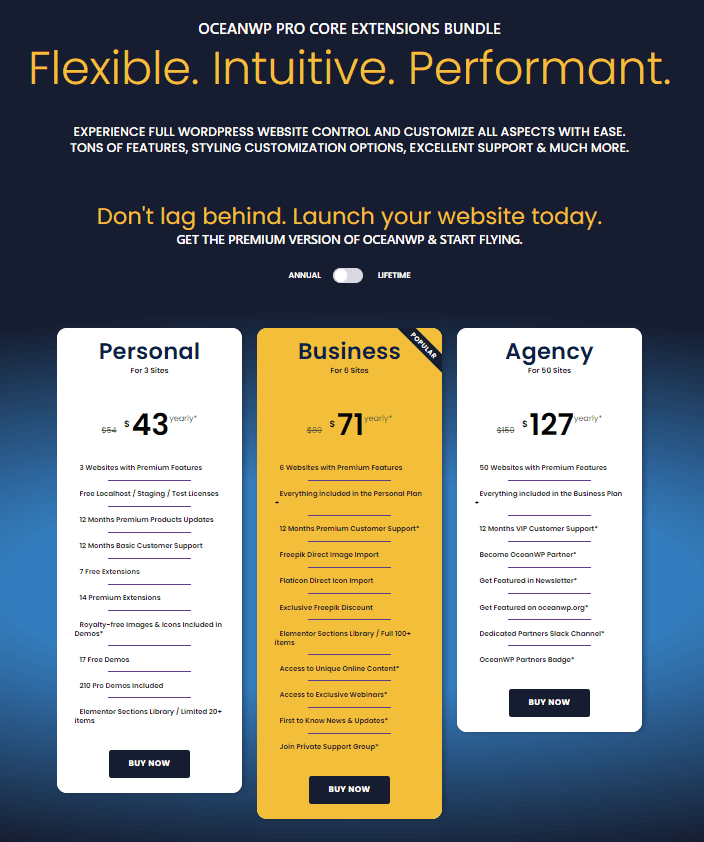
Suppose you’re selling a security plugin for $100, and you also have a WordPress security eBook for beginners that’s valued at $20. “You can bundle these products at $101, which means you’ll virtually be giving the eBook away for free,” Vova says. “This not only creates a higher perceived value: it also helps you achieve your goal of pushing the eBook to more people. In this scenario, a bundle is an opportunity to promote relevant products and assets that the buyer (probably) wouldn’t even think about purchasing without the psychological power of discounts.”
Finally, plugin bundles could also aid in setting up your business for acquisition. “They’ll drive up your ASP (Average Sale Price) and MRR (Monthly Recurring Revenue), which will make you more attractive to buyers,” Vova explains.
Benefits aside, let’s get to the really exciting part 🤑 Which is…
The Art of WordPress Product Bundle Pricing
I’ll cut to the chase: How you determine your product bundle pricing strategy is up to you. There’s no one-size-fits-all approach or formula; it’s an art and science in and of itself. However, there are a few practical considerations to bear in mind.
- It’s important to understand that the value of a bundle hinges on the individual prices of its products. “If the bundle is a combo of two products where one costs $100 and the other $20, it’s unlikely you’ll be able to charge more than $110. In this case, the price point isn’t very high,” Vova says. “On the other hand, if the bundle consists of ten plugins that cost $100 each, you can charge a higher price, like $500.” The different price points in this example reveal more than what to charge for your bundle: they also illuminate your goal.
- In the former example, your goal is — probably — to create exposure by getting your products in front of more people or generating traction for less popular ones. You can still increase profit by selling bundles, but make sure your pricing strategy guides your primary objective: growing your business.
- In the latter example — where you discount ten plugins at 50% — your intention is probably to make more money, which is perfectly fine. “If your main drive is to increase profit, you should consider grouping your top-selling plugin with a bunch of complementary add-ons or other plugins,” Vova says. “And if you have enough plugins or add-ons, include three different bundle packages. Let’s call them Silver, Gold, and Platinum. The Platinum package will be the most expensive and include products most users probably won’t need. Therefore, try to focus on the Gold package. Make sure it includes everything the typical customer requires, and price it in a sweet spot between the Silver and Platinum offerings.”
- Finally, make sure you always experiment with pricing. It will help you find a sweet spot and allow you to navigate changes in the market. Be sure to consult Freemius’s article — The Anatomy of a High Converting Pricing Page for WordPress Plugins & Themes — for detailed insights on the subject.
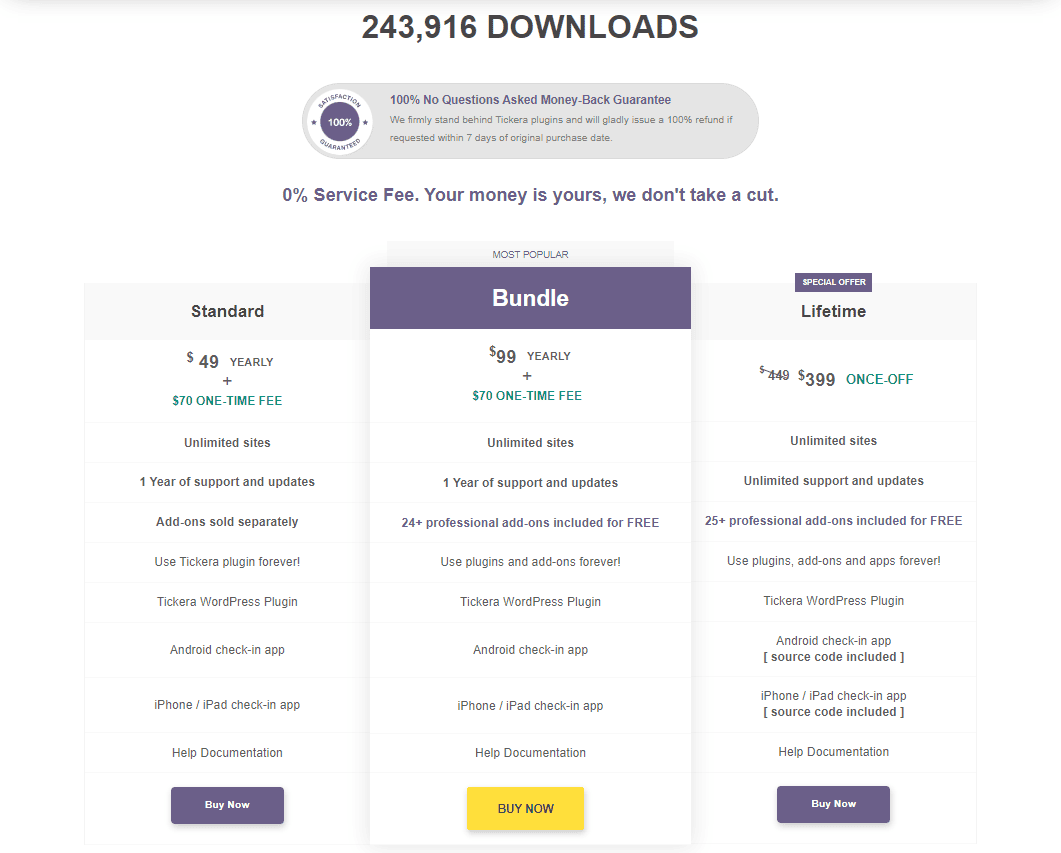
We’ve shown why WordPress plugin bundles (and memberships) give developers a chance to grow their businesses and make more money. However, while there are no concrete cons to selling them, they do pose somewhat of a personal obstacle.
Grab a free copy of our Cheat Sheet for
Selling Plugins and Themes
A growth roadmap with concise, actionable tips for every milestone of WordPress product development.

Can WordPress Plugin Bundles Sell Your Products Short or Devalue Them?
Look, we get it. Your blood, sweat, and tears make up the glue that holds your WordPress products together. Bundling means discounting them, so initially it’ll likely feel like you’re cheapening your creations.
But does this mean you’re selling them short? Vova weighs in:
Opinions are divided on this. Some sellers believe discounting products — bundled or not — equals devaluing them. However, others understand that discounts in sales and marketing are powerful tools. Why? Because they help you drive more sales.
But do bundles have to be discounted? Can’t they simply be a collection of compatible products that solve a problem? “If you don’t offer a discount on a bundle, there’s practically no reason for people to buy it,” Vova explains. “They could simply select the products they need from you and buy them individually. The only scenario that warrants very little discount on a bundle is if there are no alternatives to your products. However, in time, competitors will catch on and give you a (literal) run for your money.”
If you still feel strongly about keeping your prices intact, there is a workaround. “An alternative to discounting a bundle is offering some kind of added value,” Vova says. “For example, you could include a free sixty-minute consultation with the customer, which they wouldn’t be able to get otherwise.”
Assuming we’ve sold you on WordPress plugin bundles 😉 Let’s take a look at some strategies you can use to get them in the hands and hard drives of customers.
Marketing Techniques to Help You Sell Bundles
The following suggestions offer simple hacks to create hype and sell your WordPress Product bundles.
Promote Your Brand by Offering Use-Case Bundles on Your Site
Remember when we spoke about using WordPress plugin bundles to establish authority? You can also utilize them as a mechanism to enhance your content. How? Write a blog post or publish a video that discusses a problem or use case. Then, conclude by offering — you guessed it — a WordPress plugin bundle that magically solves the issue at a discounted price.
For context: check out this article by IconicWP, where the use case is Black Friday/Cyber Monday. The article provides a detailed breakdown on getting your eCommerce store BFCM-ready and concludes by offering an all-access pass to all of IconicWP’s WooCommerce plugins to expedite the process.
Offer Use-Case Bundles on Other Sites Too 😏
If you don’t feel confident enough in your own content yet — or even if you do, for that matter — consider affiliate marketing. If there’s an article that covers a topic or problem and you own a product set that could offer a solution, reach out. Try to strike a deal with the owner to promote your bundle in their article. Not only will this lead to more sales, but it will also generate publicity for your business.
Offer Related Product Bundles on Single Product Pages
This requires a slightly more sophisticated approach, but offering a relevant bundle/membership deal on a single-product page can be potent. Check out this example on IconicWP’s store where they unpack their Delivery Slots plugin, offered at $129/year. On the same page, they offer a single-site membership deal to their All Access Club at $299, as well as a three-plugin bundle deal at $149/year (in other words, only $20/year more for three extra plugins).
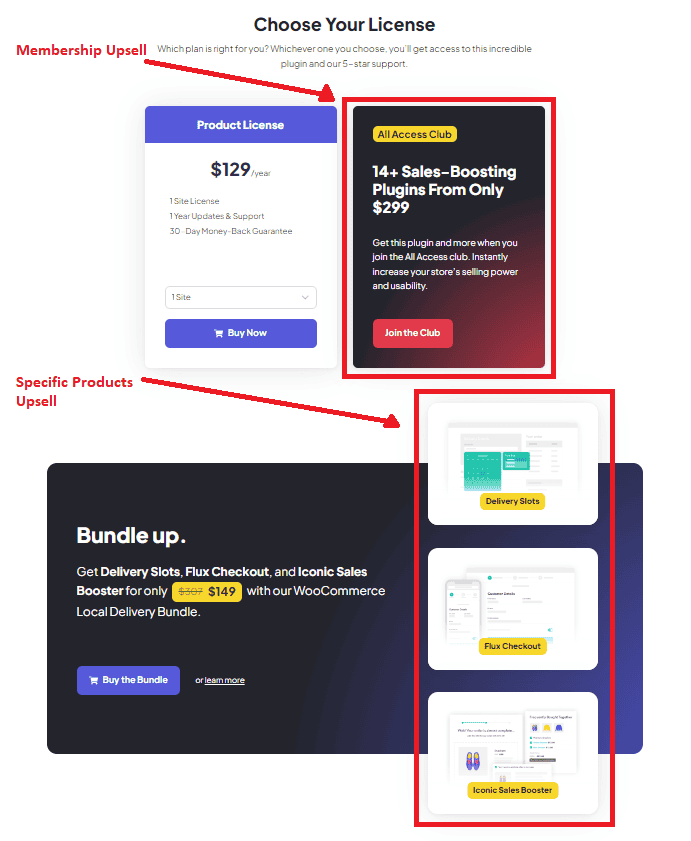
Set Bundles
This is a bold move, but if you notice that certain plugins are selling in bundled format more than they do individually, offer them in bundles only.
Don’t do this with all your plugins, though, and definitely not with your flagship offering(s). Remember, bundles are valuable to customers because they offer a set of plugins at a discounted price point. You need individually priced plugins in your inventory to validate discounts on product bundles in the first place.
Limited Edition Bundles
Another tricky strategy, but one that could yield good returns.
You obviously shouldn’t offer a limited edition WordPress bundle if it solves a common problem and therefore has longevity. However, a limited edition bundle can work in your favor on certain occasions.
An example: You launch a new plugin and bundle it with an unrelated eBook or plugin for a limited time only. Bundling the new plugin with either of these products may not hold much value as a standard offering. But in this case, novelty paired with a ticking clock could very well spark a buying frenzy.
Limited edition bundles can also yield great results for promotions like Black Friday/Cyber Monday. You can offer all of your inventory in a single bundle specifically as a BFCM deal (meaning, this bundle is only available for a limited time and not outside of the BFCM promo).
We’ve given you the lowdown on WordPress plugin bundles and why they’re effective for driving sales and promoting your business and brand.
Now, it’s time to…
Deploy Your Bundle of Joy
WordPress plugin bundles are by no means the alpha and omega of driving sales and growing your business, nor are they the only way to cross-pollinate with other entrepreneurs or build authority in the ecosystem. But if you’ve got a solid set of related products in place, there’s no reason why they can’t form part of a surefire strategy to prosper in WordPress.
Want to know how to put together a great checkout experience for your WordPress plugin bundle? Freemius is a trusted solution for selling WordPress plugins, themes, static software, and SaaS, and we’re passionate about partnering with solopreneurs and SMEs and seeing them succeed. Email [email protected] and let’s chat.



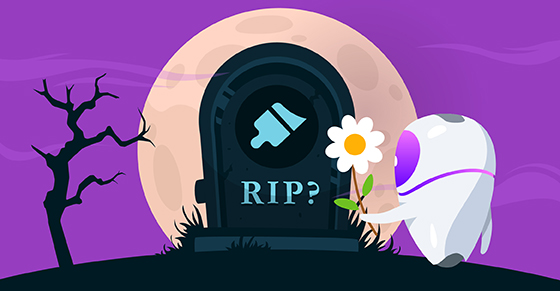


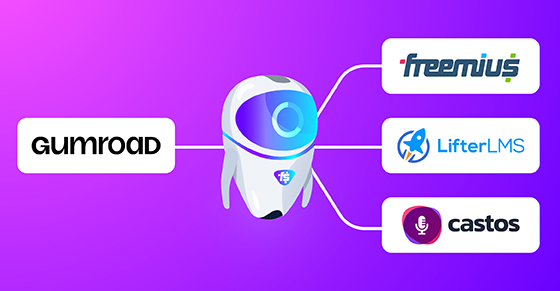


Probably bundles are good for established brands.
When it comes to new plugins on the market, we see it's easier to promote a plugin that has a clear and focused name and job to be done rather than a catch-all bundle.
What I'm trying to say, is, positioning seems easier for plugins than for bundles.